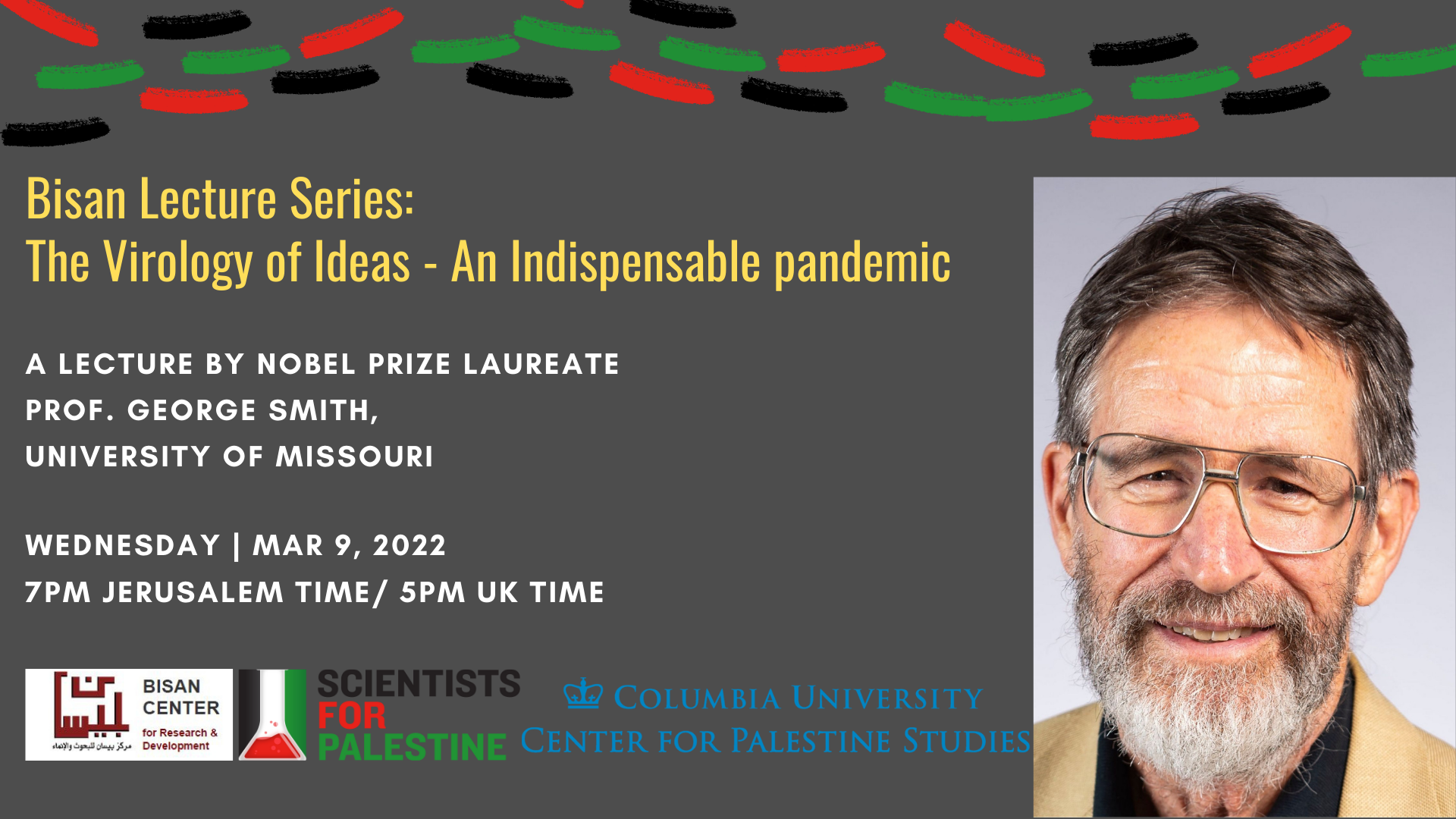Dear colleagues, We are pleased to announce that the inaugural webinar of the Bisan Lecture Series (BLS) will take place on Wednesday, March 9th at 7pm Palestine time (6pm Central….

Dear colleagues,
We are pleased to announce that the inaugural webinar of the Bisan Lecture Series (BLS) will take place on Wednesday, March 9th at 7pm Palestine time (6pm Central European Time, 12 noon US Estern time). We will have the pleasure to welcome Prof. George Smith (University of Missouri, Nobel laureate in chemistry in 2018) who will speak on
Title: The Virology of Ideas—An Indispensable Pandemic
Abstract: “Ideas” (cultural innovations) are likened to viruses that proliferate through community infection, being subject to massive random variation and ruthless natural selection as they spread. “Variants of interest”—extremely rare cultural Omicrons—emerge unpredictably from global communities; they’re not the intellectual property of individual brains. Individual brains’ contributions depend on their residence in a global “ideosphere”—the cultural analog of an ecological biosphere. Injury to any part of the global cultural community, such as Israel has inflicted in Palestine, is an injury to the entire global community. Liberation from such injuries is a cultural as much as a political and moral imperative.
You can register for the event on Zoom here.
George Smith is a biologist committed to the free dissemination of scientific ideas and resources. At his Nobel Prize in Chemistry award ceremony in 2018, he explained that he was sharing the prize for an innovation that emerged from the combined work of the overlapping global scientific communities he belonged to, not specifically from him personally or from his research group.
George graduated from Haverford College and, after a year working in a cancer research center in Philadelphia, took a PhD at the Harvard Medical School. Already as a graduate student he was politically active. This was the era of the U.S. war in Vietnam. Despite being beyond draft age, he turned in his draft card and was consequently immediately drafted. He risked imprisonment by refusing induction, but in the event was not prosecuted.
A common thread of George’s research has been the study of genetic diversity, in antibodies, repetitive DNA sequences, and finally in combinatorial chemistry. He began to investigate the assembly of filamentous phages (long, thin viruses that infect bacteria), with a specific interest in designing DNA cloning vectors to evolve new proteins. That is the work that eventually evolved into the elegant innovation that he introduced in 1985, and that set in train the development of “phage display” technology by numerous scientists around the world. In this technology, enormous peptide “libraries” are generated on the surfaces of bacteriophages, allowing extremely rare peptides that bind a target biomolecule, a receptor, to be selected using simple microbiological techniques.
This method has led to new pharmaceuticals, and to development of a range of antibody drugs used as anti-cancer or anti-inflammatory therapeutics. George received the Nobel Prize in Chemistry in 2018 for this work, sharing the award with Greg Winter and Frances Arnold.
George never patented phage display, and he and his colleagues were enthusiastic disseminators of the technology to laboratories throughout the world, freely providing seed stocks, detailed protocols, and advice.
George is a strong advocate for Palestinian liberation, and a co-founder of Mid-Missourians for Justice in Palestine. This organization has an active agenda, and in 2020 fought against passage of discriminatory Missouri legislation preventing the state government from contracting with companies that boycott Israel.
Below is a short video presentation of the BLS, highlighting the host institution the Bisan Center for Research and Development.
This lecture is sponsored by the Bisan Center for Research and Development, Scientists for Palestine and the Center for Palestinian Studies of Columbia University
Hoping to see many of you at this webinar, we send you our best regards.
The Bisan Lecture Series Steering Committee
Next BLS webinars
– Wednesday April 13 2022, 7 pm Palestine time
Dr. Honaida Ghanim (Director of the Palestinian Forum for Israeli Studies “MADAR”, Visiting Professor at Birzeit University)
Title: Post-justice, exceptionalism, and the normalization of Apartheid
– Wednesday May 11 2022, 7 pm Palestine time
Dr. Gertrudis Rojas (Center of Molecular Immunology, Havana, Cuba)
To receive BLS announcements, you can subscribe to the mailing list here.
BLS Statement of purpose
In concert with Scientists for Palestine and the Bisan Center for Research and Development, and in keeping with their joint commitment to full integration of Palestine in the global community of learning, the Bisan Lecture Series sponsors discourses on subjects of cultural, scientific, and societal importance by leading research experts and public intellectuals of varied heritage and viewpoint. The interactive webinars are free and open to the public, and recordings of each will be posted soon afterward.
